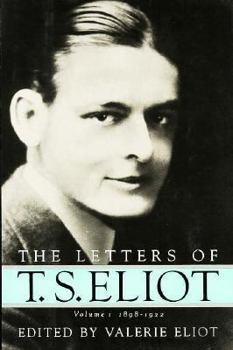Letters of T.S. Eliot, Vol. 1: 1898-1922
(Book #1 in the The Letters of T.S. Eliot Series)
Select Format
Select Condition 
Book Overview
In two highly anticipated volumes, the correspondence of the twentieth century's eminent man of letters, from youth to early manhood Volume One: 1898-1922 presents some 1,400 letters encompassing the... This description may be from another edition of this product.
Format:Hardcover
Language:English
ISBN:0151508852
ISBN13:9780151508853
Release Date:September 1988
Publisher:Harcourt, Brace, Jovanovich
Length:638 Pages
Weight:2.81 lbs.
Dimensions:9.8" x 2.3" x 6.8"
Customer Reviews
2 ratings
even famous people have problems
Published by Thriftbooks.com User , 22 years ago
Old Possum's Book of Practical Cats (the source of the long running Broadway musical CATS). Murder in the Cathedral. The Waste Land. The Cocktail Party. Prufrock. The Hollow Men. All books I'd heard of or had to read in school --some I actually enjoyed--all written by T.S. Eliot, winner of the 1948 Nobel Prize for literature. An American with an advanced case of anglophilia who went to Britain as a student and basically never went back. Marrying an unsuitable woman -his former secretary- may have had something to do with it (like Princess Di she was high strung and couldn't cope with the duties that came along with her husband's professional and social position). It's interesting to see that poetry is a business like any other in that inspiration is maybe 1% and hard work makes up the other 99% (would you believe a famous literary battle about how to position on a page the words in a poem?). Money problems, literary feuds, the miserable business of publishing a magazine where you think your partners are about to screw you financially, it's all there. A nice friendship with a female cousin and a Frenchman who wrote beautiful letters. Begging letters to mom and then to an older brother for money. Somehow the life of one of the early 20th century's greatest poets and man of letters is very prosaic.(Thank goodness we are spared Eliot's letters to his wine supplier which made up a considerable proportion of the correspondence of Lewis Carroll (author on Alice in Wonderland!). Still, worth reading for T. S. Eliot's nice way with words even in the most ordinary correspondence.
a poet in his prose
Published by Thriftbooks.com User , 26 years ago
No biography of Eliot could better capture the thoughts and personality of the young poet than these letters. Eliot had a lively correspondence with so many, including family, friends, editors, and partners in verse. Even the short letters -- like the ones in which Eliot simply announces to his correspondent that he's exhausted and doesn't want to write anything -- give a glimpse of how Old Possum acted.Eliot's poetry is so cerebral and allusive that when reading it, one can feel at his mercy. In his letters he is far less in control, and the contrast is fascinating.






